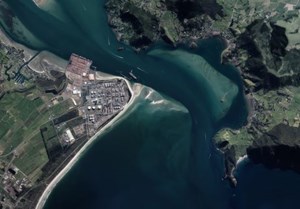News
Channel Infrastructure and Fortescue Future Industries progress scoping study for green H2 production at Marsden Point
Fortescue Future Industries (FFI) and Channel Infrastructure’s study into the potential feasibility of green H2 production at Channel’s Marsden Point site is progressing, with the next phase, focused on manufacturing supply for the domestic market, expected to be finalized in the first half of 2023.
The initial stage of study works included an assessment of the feasibility of production, storage, distribution, and export of industrial-scale green H2 from Marsden Point and determined that domestic production and use presented the best option for further assessment.
The focus of the study will now shift to the viability of options to produce green H2 and green H2 products for domestic use in New Zealand, with a range of potential uses under consideration including transport fuel and the production of e-SAF.
FFI’s New Zealand Country Manager Amy Barrett said the local production of green H2 stands to support New Zealand’s energy transition, particularly the decarbonization of hard-to-abate sectors including aviation, heavy transport, gas networks and industry.
“This is about doing what we can to repurpose existing infrastructure to meet the needs of future industry, help reduce reliance on fossil fuels, and meet emissions targets,” Barrett said. “Our focus now is largely on the feasibility of production for domestic use, utilizing the location and the facilities that already exist at the site. This is about equipping New Zealand with options for its energy transition, so it can realize the economic and environmental benefit that could come from that.”
Channel Infrastructure CEO Naomi James said, “Throughout our transition, Channel Infrastructure’s priority has been to assess every opportunity to utilize the existing assets and infrastructure that we have at Marsden Point, and to prioritize work that will support New Zealand’s move to lower-carbon, affordable fuel options. Hydrogen is one of the examples where we are well positioned to support this developing industry as it matures in New Zealand, and we are excited to be continuing our work with FFI on green hydrogen. We are delivering on our plans to utilize Marsden Point’s highly strategic assets to deliver long-term shareholder value, while at the same time supporting our customers to decrease their environmental impact in the future.”
Ms James added, “Access to low-cost renewable electricity is a key imperative to make green hydrogen economic and this is a particular challenge in Northland. We are working hard to address this challenge for our Marsden Point operations through the RFI that we recently released. We look forward to receiving the responses to this RFI and progressing our plans to secure long-term, affordable electricity supply for our operations at Marsden Point.”
e-SAF is a synthetic aviation fuel, which can be produced by combining green H2 and CO2 to produce a hydrocarbon from which sustainable aviation fuel can then be produced. It overcomes the constraint of sourcing enough feedstock and does not compete with food production.


